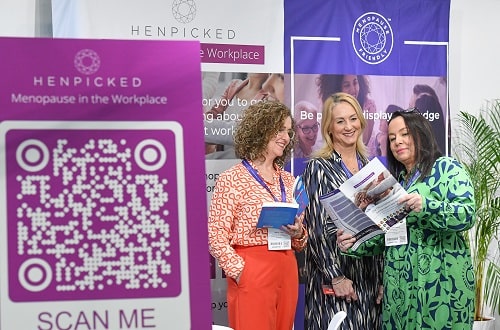Creating an environment at work where everyone feels comfortable talking about menopause can make it easier for employees struggling with the symptoms to seek help and support from their managers.
Features
Why it’s important to be a menopause friendly employer
You would need to be living on the moon to be unaware of the issues and debates we are currently experiencing around menopause in the workplace. That the subject is being talked about widely is a big step, but we still have a long way to go before all employers are menopause friendly.
And what, in fact, does it mean to be a menopause friendly employer? What training, commitment and action are required? And where can HR, occupational health and safeguarding teams signpost colleagues for trusted, authentic support?
You may be pleasantly surprised just how accessible and achievable it is to be a menopause friendly employer.
 Deborah Garlick, CEO and founder of Henpicked: Menopause in the Workplace
Deborah Garlick, CEO and founder of Henpicked: Menopause in the Workplace
Starting out
Back in 2016 when I first started speaking to employers, I couldn’t find a menopause in the workplace policy in the land. Fast forward to today and CIPD estimates 30 per cent of organisations have a ‘working’ menopause plan in place. The Rt Hon Caroline Nokes MP, chair of the Women and Equalities Committee, acknowledges this is certainly progress but wants to see many more employers step up to the plate.
She has set the challenge for at least 50 per cent of businesses to be menopause friendly by World Menopause Day on October 18, 2023 and is encouraging businesses to ‘find a friend’ to support in the process. If every business which currently has a menopause policy in place encourages at least one other business in their network to do the same, we would reach the target.
We are playing our part by asking our network of menopause friendly employers to run roadshows inviting other businesses to find out more and learn from their experience. The roadshows start in March 2023 and will run up to Easter with new dates being added each week here: Henpicked: Menopause in the Workplace Events | Eventbrite.
Why is menopause a big business issue?
Typically, menopause occurs between 45-55 but the perimenopause (the transitional phase leading to menopause) starts years earlier. This age is also when a great many of us are near the peak of our careers. As we are living and working longer, it means many will be working through their menopause years and beyond.
There are currently 3.5 million women aged 50-65 in the workplace so this is a big business issue. Organisations need to support and keep these talented and experienced colleagues: it’s in everyone’s best interests.
What is a menopause friendly workplace?
In a nutshell, a menopause friendly workplace exists where there is an inclusive culture in which colleagues can speak freely, be truly listened to and have their requests for support and help acted upon.
A menopause friendly employer will raise awareness of the menopause across the whole organisation, to encourage empathy and understanding. They will speak to colleagues and seek to find out what their concerns are, what would make their life easier at work and then act on these by making reasonable adjustments in the workplace.
They will introduce support structures, appoint menopause advocates and ensure that all senior management, HR staff and supervisors are trained so they are confident in how to advise and help colleagues who need their support. In effect, a menopause friendly employer will change the lived experience of menopause in the workplace.
 Some people are barely affected by the menopause, while others can be completely floored by their symptoms. Photograph: iStock
Some people are barely affected by the menopause, while others can be completely floored by their symptoms. Photograph: iStock
First steps to being a menopause friendly employer
1. We always start by asking employers to ask their employees these two questions. First, what is getting in the way of you being your best at work and, second, what can we do about it?
2. Actively listen to people’s answers to find out what’s working – and what’s not. Use this to shape your bespoke Menopause Workplace Policy. Revisit it often to evaluate your progress and next areas to address.
3. Start the conversation to break the taboo surrounding menopause. A good start point is hosting a talk from an expert speaker. This will bring the topic into the open and encourage people to speak openly about their own experience, ask for help and even share their own tips.
4. Train ALL colleagues so that everyone is aware of menopause and managers, HR teams and department heads all feel confident and ready to support colleagues.
5. Train up individual menopause champions at all levels across the business so everyone feels they have someone in their department or at their level to talk to. Include younger colleagues and men too – as they will relish the chance to have menopause demystified to help them support the women in their lives at home as well as at work!
6. Make resources and support readily available: whether that’s expert information and signposting on your work intranet or looking at your environment and thinking about access to ventilation, like a fan, or staff uniforms.
The very heart of this lies in the wish to create the best environment in which colleagues can work and support each other. It is essential that senior stakeholders are involved, showing they understand its importance. It is so important to create a culture where it’s a safe space for anyone to speak up. While having Menopause Champions ensures trained ambassadors are available in an organisation as a focal and help point for colleagues, it is also of the greatest importance that senior managers and line managers are trained on menopause in the workplace so they are comfortable in engaging in discussions and making well-considered workplace adjustments.
The impact of menopause symptoms at work
Menopause symptoms are very varied and affect everyone differently. Some people are barely affected, while others can be completely floored by their symptoms. These are among the most common, but there are over 30 physical and mental symptoms, including:
- Hot flushes / night sweat
- Fatigue and difficulty sleeping
- Difficulty focusing – often called ‘brain fog’
- Anxiety and worry
- Aching joints
- Dry skin
- Reduced confidence
- Mood changes
- Feelings of ‘loss of self’.
Shaping a bespoke menopause workplace policy
No two individuals will have the same menopause experience and no two businesses will face the same challenges. This is why generic, off-the-shelf policies are pretty useless and sweeping codes of conduct for managing menopause in the workplace aren’t effective.
Instead, business leaders need to truly listen to their employees and talk with those who are experiencing menopause symptoms about how they personally are affected in the workplace. Policies need to be shaped around the individuals and type of work roles in the organisation. They must be active policies which are constantly reviewed to ensure the right support is in place
and we encourage our menopause friendly members to share their best practice so similar businesses can benefit from the learnings of their successful policies.
Creating a menopause friendly environment
Small, inexpensive changes can make a big difference at work. Think about temperature control and let people sit where’s best for them, away from heat sources, perhaps near a window or air conditioning.
Make desktop fans readily available and ensure fresh chilled water is accessible at a water cooler station or in the staff kitchen. Allow people to have a quieter workspace away from the hubbub and allow them to take short breaks if they need some time out. It will help to allow flexible working hours or working from home to ease the difficulties that arise if they’re not sleeping well. Provide free sanitary products and toiletries to enable employees to freshen up at work. None of these things is difficult to do or expensive but they’ll make a big difference.
 Allow people to have a quieter workspace away from the hubbub and allow them to take short breaks if they need some time out. Photograph: iStock
Allow people to have a quieter workspace away from the hubbub and allow them to take short breaks if they need some time out. Photograph: iStock
Training for businesses
There is an increasing amount of information available to help businesses but nothing beats bespoke training to really help organisations find the right support pathways for their workforce. We started working with employers seven years ago – before menopause in the workplace was properly accepted. Henpicked: Menopause in the Workplace is now industry-recognised and the leading provider of training services to organisations. Our team works with employers to build a bespoke plan that will suit their business needs and typically it will include these elements:
- Creating the strategy and objectives to achieve the right outcome
- Training for colleagues
- Training for managers and leaders
- Training for HR and occupational health colleagues
- Training for menopause champions
- ‘Train the trainer’ programmes for advocates in the workplace who, in turn, can train colleagues and keep them up-to-date / informed
- And digital solutions such as e-learning.
Alongside this, Menopause Friendly members have access to a wide range of toolkits, online events and conferences, enabling people to keep learning and keep progressing
All the training has been developed by and is undertaken alongside industry experts including menopause experts, industry leaders, academics and solicitors. It is all CPD-registered and includes a comprehensive best practice toolkit to support colleagues long after the initial training is completed.
We have trained thousands of employers, large and small, to provide them with everything they need to build awareness and education around menopause. This way, not only can they introduce training and awareness, but they can progress and maintain the right support in their workplace.
Menopause Friendly Accreditation
Those employers who wish to go one step further, can apply for The Menopause Friendly Accreditation which is, in effect, a kitemark of excellence for menopause in the workplace. A truly meaningful badge, it is awarded to employers who can demonstrate to an Independent Panel that they have put in place the right standard of menopause awareness, education and support. The Menopause Friendly Accreditation marks out employers and organisations which have made and demonstrated an absolute commitment to bring positive and lasting change in their workplaces.
Signposting individuals
Alongside providing help and guidance at work, employers may wish to signpost individuals to further resources. As more and more people talk about menopause, a myriad services, websites and community groups have sprung up. One of the more established hubs which I set up in 2015, is the Henpicked: Menopause Hub. It’s completely free and proud to have no advertising, no paywall and no bias. A community website, it offers people everything they need to know about menopause, including expert advice to allow individuals to make informed choices. There are regular ‘lunch and learn’ sessions from expert contributors which include people whose working background is from general practice, oncology, nutrition, psychology, obstetrics and gynaecology and more.
Business benefits of being menopause friendly
Quite apart from the fiscal benefits of employers retaining their more experienced staff, reducing staff absence by addressing and avoiding illness and avoiding the risk of costly employer tribunals by ensuring all colleagues are looked after properly, being menopause friendly benefits businesses in other ways. It sends a clear message to potential employees that this is an organisation that cares about its employees’ wellbeing and holds their best interests at heart. The inclusive culture and empathy this engenders promote a sense of understanding and unity, making this a desirable place to work.
No longer a taboo topic
By listening and talking to colleagues, individuals’ needs can be addressed. By getting the expert training and using this to compile and execute a bespoke policy which is active and supportive you will be creating a menopause friendly workplace (and world).
Menopause is nothing to be ashamed of or anything to be embarrassed about. It should be a normal word which everyone can use. I want us to get to a point where, if someone is asked if they are struggling with menopause symptoms, their response will be ‘Not really. I know what to look for and what to do.’ That is when we will have achieved the success we want.
Supporting staff through the menopause: real life success stories
Natalie Beresford, detective inspector & Force Menopause Project lead at Thames Valley Police
Natalie was so heavily impacted by the menopause, that she even considered leaving her role. She felt the support offered by the force to colleagues affected by the menopause could be better and, with the organisation’s support, Natalie championed many changes.
Since then, Thames Valley Police became the UK’s first Police Force to be recognised as a Menopause Friendly Employer and achieve Menopause Friendly Accreditation.
“Henpicked: Menopause in the Workplace ran training webinars for our staff,” says Natalie. “Their outside perspective and expert delivery reached over 200 colleagues at once: it was the best way to start the conversation around menopause. They also trained buddies from all departments, across all ranks and including police and police staff. Having access to peer support and understanding enables individuals to remain in their role while working through their menopause. It’s invaluable.”
Kathy England, 58, service request manager at Experian, really struggled with her menopause symptoms until she approached her employer and together they worked towards shaping a policy, engaging colleagues and making a difference.
“Our menopause policy was only part of the solution – people needed to know what it was, where it was and why they should read it and act on it,” she says “One activity I suggested was a six-week course of menopause wellbeing sessions. People came along and word spread: suddenly a small group bonded and that just grew and grew.
“There was so much to learn and when Deborah hosted a Menopause in the Workplace Roadshow in London, I attended. I brought back so much information and started to share it across the company comms. Every week someone new phones me up to thank me for paving their way. It makes me cry! I can hardly believe how far we’ve come.”
Corinne Mills, director of people at Alzheimer’s Society, the most recent recipient of The Menopause Friendly Accreditation
“With one in four people experiencing serious menopause symptoms across society, it’s so important that our workplace is a friendly, supportive and understanding environment. Our Menopause Matters network is a safe space for staff to share resources, talk openly about their experiences and host guest speakers.
“In the 14 months since we established this network, we’ve seen 170 new members – that’s 10 per cent of our workforce. We are so proud to have gained The Menopause Friendly Accreditation and to have our efforts recognised by the Menopause Friendly Independent Panel.”
Chris Pitt, chief executive of first direct
“Part of ensuring a menopause friendly workplace involves encouraging an open dialogue around menopause, where our people feel heard and supported.
“Menopause often impacts women when they are at the peak of their careers, but it is important to recognise that this isn’t just a women’s issue – it affects family units as a whole. Supporting the wellbeing of all our people is central to first direct’s success and this involves breaking the taboo around menopause by helping all our managers and colleagues understand it better. It is the right thing to do – for our people, and our business.”
For more information and advice see: menopauseintheworkplace.co.uk
henpicked.net/menopause-hub
Deborah Garlick is CEO and founder of Henpicked: Menopause in the Workplace
FEATURES

Why line managers play a vital role in workplace wellbeing
By Marcus Herbert, British Safety Council on 03 September 2023
The behaviours of line managers can have a positive or negative impact on employee health, wellbeing and engagement, so it’s vital managers get staff feedback on whether their management style is supportive or negative, and have regular check-ins so workers can raise concerns about their wellbeing.

Watercooler Event to hone in on eight trends in employee health and wellbeing
By Claire Farrow, Make a Difference Events & Media on 15 April 2024
The free-to-attend Water Cooler Event at ExCeL London on 23–24 April will see more than 6,000 workplace experts coming together to explore the latest thinking, solutions and best practice for supporting and boosting employee wellbeing, diversity and workplace culture.

Sedentary working and how to combat the ‘sitting disease’
By Gavin Bradley, Active Working on 05 April 2024
Prolonged and excessive sitting poses a major risk to our health, but the Get Britain Standing campaign and On Your Feet Britain Day on 25 April are a great way of encouraging workers to sit less and move more.



